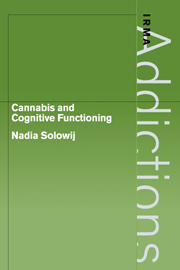Book contents
- Frontmatter
- Contents
- Series editor's preface
- Author's acknowledgements
- 1 Statement of the problem
- PART 1 A REVIEW OF THE LITERATURE
- 2 Cannabis the drug
- 3 Acute effects of cannabis on cognitive functioning
- 4 Evidence for brain damage associated with the long-term use of cannabis
- 5 Chronic effects of cannabis on cognitive functioning
- 6 Selective attention and event-related potentials (ERPs)
- PART 2 RESEARCH
- Appendix
- References
- Index
3 - Acute effects of cannabis on cognitive functioning
from PART 1 - A REVIEW OF THE LITERATURE
Published online by Cambridge University Press: 16 September 2009
- Frontmatter
- Contents
- Series editor's preface
- Author's acknowledgements
- 1 Statement of the problem
- PART 1 A REVIEW OF THE LITERATURE
- 2 Cannabis the drug
- 3 Acute effects of cannabis on cognitive functioning
- 4 Evidence for brain damage associated with the long-term use of cannabis
- 5 Chronic effects of cannabis on cognitive functioning
- 6 Selective attention and event-related potentials (ERPs)
- PART 2 RESEARCH
- Appendix
- References
- Index
Summary
The acute effects of cannabis on cognitive functioning have been reasonably well researched. The literature, though, is so vast that any attempt to summarize the findings will necessarily be an oversimplification. This review will selectively focus on those aspects of cognitive functioning that are of relevance to the research reported in Part 2 of this monograph. The substance of this research concerns the long-term cognitive effects of cannabis and accordingly the review of the literature on chronic effects in Chapter 5 is very thorough. While the premise that a knowledge of the acute effects of a drug may provide the basis for research into possible long-term consequences of use is reasonable, the acute and chronic effects of a drug need not necessarily be the same (Block et al., 1992; Block & Ghoneim, 1993) and can in fact be markedly different (Pomara et al., 1983). Also to be borne in mind is the fact that many factors impinge on the effects experienced by the user when acutely intoxicated. These include the dose, the mode of administration, the user's prior experiences with the drug, any concurrent drug use, the “set and setting”, i.e. the complex of user's expectations, attitudes towards drug effects and mood state, and the social environment in which the drug is used (Jaffe, 1990; O'Brien, 1996). Many of the effects of cannabis are also subject to the development of tolerance (Jones, 1983; O'Brien, 1996) and thus naive users may show a greater decrement in performance than experienced users.
- Type
- Chapter
- Information
- Cannabis and Cognitive Functioning , pp. 29 - 39Publisher: Cambridge University PressPrint publication year: 1998
- 1
- Cited by



